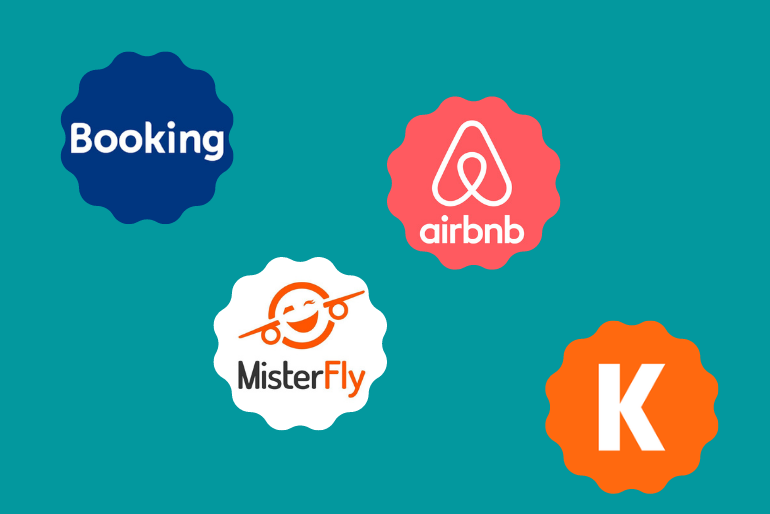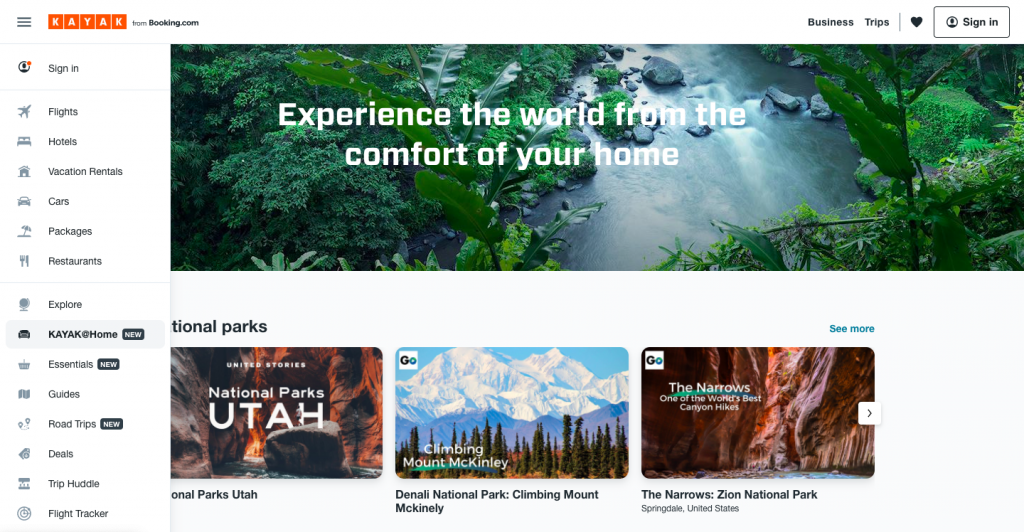Booking a hotel and/or a car rental at the same time as a plane ticket has been a possibility for a while. For some people, it is impossible to even think back to the days when it was not. As the years go by, travelers from all kinds are leaning towards access to more and more perks when it comes to their traveling habits. Understandably so, many services now exist to make traveling easier for everyone. Travel companies are now aware that they have the power to change the game. And their goal is clear: accompany travelers on their entire journey. From the moment they step out of their house to the moment they reach their destination.

Booking.com, Mister Fly, Airbnb, Kayak. What do these travel pure-players all have in common? The understanding that additional sales have become essential. In this context, Kayak sets an example of cross-selling success. Thanks to a wide variety of services that can be booked directly from its website, the meta search engine is one of the companies that can boast about offering a complete travel experience to its clients.
On top of flights, hotels, car rentals, and holiday packs, the US-based company now enables potential clients to get a sneak peek at the restaurants available in the visited area. The restaurants are organized by categories of cuisine, with the possibility to book a table online. The Deals section of the website also offers several promo codes on a variety of activities.
Cross-selling in the time of Covid-19
As it has for the entire travel industry, Covid-19 has majorly impacted Kayak’s sales and thus called for an efficient diversification of its additional services, adapted to people’s current consumption habits and ways of traveling. When the lockdown started back in March, museums and music venues from all around the world came up with virtual tours so that people could keep exploring from the comfort of their homes… For free.

While this initiative had great success, it eventually meant that digital visits were not a way for these organizations to maintain a monthly revenue. Drawing inspiration from Airbnb’s tailored experiences, Kayak worked towards the goal to monetize this service by offering more thorough and personalized tourism experiences. It took place on its platform and thanks to remote travel activities such as virtual tours, cooking classes, or interactive webinars, to only name a few.
Domestic tourism and e-commerce for the win
Just like any other player in the industry, Kayak had to take into account the recent changes in the way people travel. More specifically, the rise of domestic tourism (which is a type of trip where both departure and arrival take part in the same country). In this perspective, Kayak designed a Road trip section that offers a different outlook on hotel booking. Instead of booking separate stays for the same trip, travelers get to organize their entire journey step by step, depending on the places that they plan to explore.

With people spending the majority of their time in their homes, online shopping turned into a habit for many consumers. This situation encouraged Kayak.com to create an Essentials shopping section from which customers can now order things such as hygiene products, fitness equipment, or groceries. Rightfully so. According to a study conducted by French Les Echos, food and beverage e-commerce was the most positively impacted by lockdown measures, reaching over 10% market shares in France as early as April 2020.
The importance of tailored services, as illustrated by Nannybag
In a recent piece published by Skift, Kabir Shahani, CEO of Amperity (a Seattle based firm which specializes in data as a marketing tool), sheds light on the importance of personalized additional sales. According to him, “Travel brands find they are more successful […] when they show only a few offers that match customers’ likely interests.”. When planned smartly, this sales technique is a great way for airlines and travel related-businesses to impact the traveler experience from top to bottom. The co-branding strategy is just that: a step further in the traveling process.
“We wanted the booking process to feel as natural as possible, so we kept that in mind to design the dedicated pages both from a UX and UI point of view. ”
Matthieu Ballester, CEO of Nannybag
The one thing that can make or break a trip is the way luggage is taken care of over the journey. Just ask your family and friends. For a few hours or several days, everyone has at some point wished they did not have to travel carrying around their baggage. Matthieu Ballester, CEO of Nannybag’s vision was built and shaped on this idea and the firm conviction that luggage storage is a growing market with a crucial role to play in ancillary travel services.
Creating a natural process
Matthieu Ballester remembers the first steps of the process: “We wanted the booking process to feel as natural as possible, so we kept that in mind to design the dedicated pages both from a UX and UI point of view. It also made sense for us to have a website directly integrated into each airline’s website because luggage storage is one of the first things that come to mind as part of the booking process.”

As a traveler, you have probably noticed it. One of the main constraints on every journey has something to do with baggage. From going to the airport to traveling on the aircraft. Knowing what to do with it once they have reached their destination can also be tricky. People often wonder what to do and how to manage their luggage. Nannybag’s business model offers answers to the above scenarios. As such, collaborating with airlines from all over the world made sense for the start up.
Co-branding as a tool for success
These situations raise the importance of a smooth booking process. It suits the will of most companies. Providing their clients with resources and access to their services and offer additional services, as effortlessly as possible. To ease the process for each user, Nannybag can create designs in line with each company’s corporate identity. As noted by Samir Senouci, Nannybag’s CTO: “This makes it possible for users to remain in the same graphic ecosystem and benefit from a simplified booking process.”
Opting for a co-branding strategy is indeed a great way for airlines to appropriate Nannybag’s service while staying true to their brand image. It also enables them to introduce the French start up as an official partner. It means that Nannybag’s technical staff works closely with its partners to ensure that the designs fit with their visual identity.
“We thought of this process as a way to enable airline customers to experience a tailored traveling experience […].”
Samir SENOUCI, CTO OF NANNYBAG
One of the steps created to implement the co-branding strategy is the integration into airlines’ confirmation emails. As highlighted by Samir Senouci, this type of email should only serve the purpose of improving the traveling experience. This goal can only be reached with pertinent offers relevant to the original purchase. As opposed to selling unrelated services or products. The process was thought of as “A way to enable airlines customers to experience a tailored traveling experience thanks to a helpful new feature.”
Making the service available to everyone, anywhere
As a whole, adding external services is not only a great way to boost revenue with additional sales. It also has a positive effect on passenger satisfaction by creating a more personalized and comfortable traveling experience. A crucial aspect given the current situation. Nannybag also wanted to make the service available to everyone. The luggage storage service is therefore also available for flight crew members.
Based on IATA codes, the booking process is also automatically available in each city where Nannybag is present. In other words, it means any time a city joins the global luggage storage network, airline customers can instantly book luggage storage there.
A difficult, yet promising context
Assessing the situation with KPIs is still an early move. Nannybag finalized the creation at the same time as the Covid-19 outbreak. However, the average 5% conversion rate observed by Nannybag on similar partnerships with other travel companies is rather promising. It illustrates the efficiency of its in-house web designing while leaving room for improvement. Especially taking into account the unprecedented situation caused by Covid-19.
Matthieu Ballester also plans on a growing presence of its new luggage delivery feature among services displayed by travel companies. An exciting challenge to continue providing people with seamless traveling experience.


